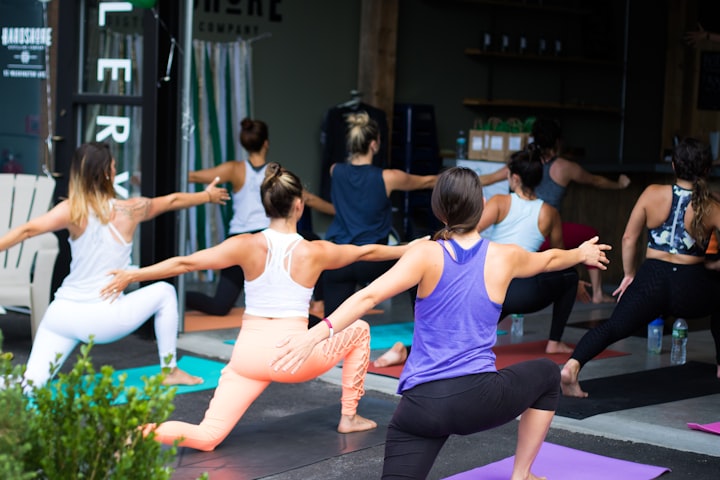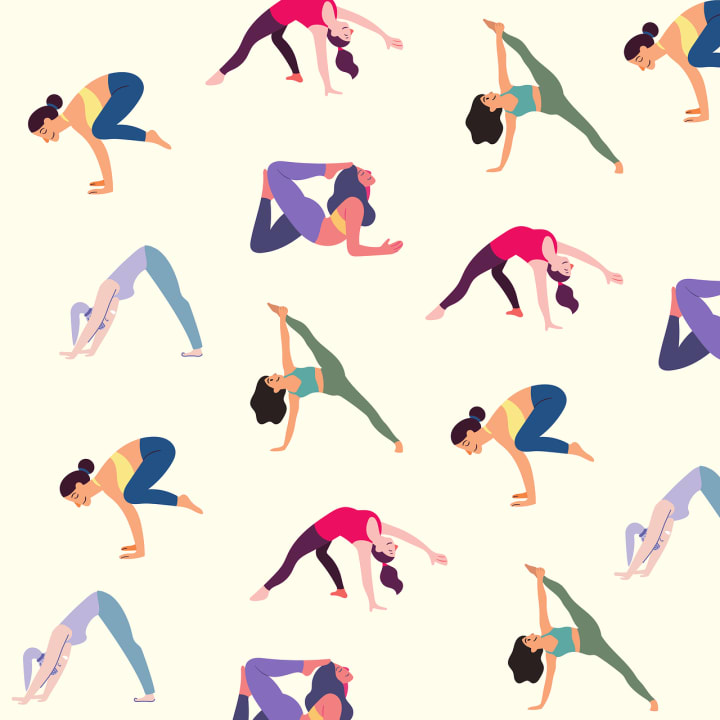Yoga for Beginners: A Comprehensive Guide to Starting Your Practice
Yoga for Beginners

Welcome to the world of yoga! Whether you're looking to improve your physical fitness, reduce stress, or find inner peace, yoga offers a multitude of benefits for beginners and experienced practitioners alike. In this comprehensive guide, we will provide you with all the information you need to start your yoga journey successfully.
What is yoga?
Yoga is a holistic practice that integrates the mind, body, and spirit. It originated in ancient India and has been passed down through generations as a means to achieve physical, mental, and spiritual well-being. The word "yoga" is derived from the Sanskrit word "yuj," which means to unite or join together.
There are various paths of yoga, but the most common one practiced in the West is hatha yoga. Hatha Yoga focuses on physical postures (asanas), breathing techniques (pranayama), and meditation to bring balance and harmony to the body and mind. It is an excellent starting point for beginners as it provides a solid foundation for other yoga styles.
Benefits of Practicing Yoga
The benefits of practicing yoga are numerous and extend beyond the physical realm. Regular yoga practice can help improve flexibility, strength, and balance. It also enhances mental clarity, reduces stress and anxiety, and promotes relaxation and overall well-being. Yoga is a low-impact exercise that can be modified to accommodate various fitness levels and physical conditions, making it accessible to almost everyone.
Some specific benefits of practicing yoga include:
Improved Flexibility and Mobility: Yoga poses gently stretch and lengthen the muscles, improving flexibility and joint range of motion.
Increased Strength: Many yoga poses require you to support your body weight, which helps build strength in the muscles, including the core, arms, and legs.
Enhanced Balance: Balancing poses in yoga improve proprioception and strengthen the muscles responsible for maintaining balance, reducing the risk of falls.
Stress Reduction: Yoga incorporates deep breathing and relaxation techniques that activate the body's relaxation response, leading to a reduction in stress and anxiety.
etter Sleep: The combination of physical activity, breathing exercises, and relaxation techniques in yoga can improve sleep quality and help you fall asleep faster.
Improved Posture: Yoga poses help align the spine and strengthen the muscles that support proper posture, reducing the risk of back and neck pain.
Increased Mindfulness: Yoga cultivates mindfulness by encouraging you to focus on the present moment and tune into the sensations of your body and breath.
Boosted Energy Levels: Regular yoga practice can increase energy levels, improve concentration, and enhance overall productivity.
Is yoga Right for You?
Yoga is a practice that is inclusive and suitable for people of all ages, body types, and fitness levels. Whether you're young or old, flexible or not, yoga can be adapted to meet your individual needs and abilities. However, it is essential to listen to your body and practice yoga mindfully.
If you have any specific medical conditions or injuries, it is advisable to consult with a healthcare professional before starting a yoga practice. They can provide guidance on modifications or precautions to ensure your safety and well-being.
How to Start Your Yoga Practice

Starting a yoga practice can be both exciting and overwhelming, especially if you're new to the practice. Here are some steps to help you get started on your yoga journey:
Step 1: Set Your Intentions
Before you begin your yoga practice, take a moment to reflect on your intentions. What do you hope to achieve through yoga? Setting clear intentions can help guide your practice and keep you motivated along the way.
Step 2: Find a Suitable Yoga Style
There are numerous yoga styles to choose from, each with its own emphasis and approach. As a beginner, it is recommended to start with a gentle or beginner-friendly yoga style, such as Hatha Yoga or Vinyasa Flow. These styles focus on foundational poses and provide a good introduction to the practice.
Step 3: Gather Your Yoga Props
While yoga can be practiced with minimal equipment, having a few essential props can enhance your practice and provide support. Some common yoga props include a yoga mat, blocks, straps, and a bolster. These props can help you maintain proper alignment and make certain poses more accessible.
Step 4: Find a Qualified Yoga Teacher
Having a qualified yoga teacher to guide you through your practice is invaluable, especially as a beginner. Look for certified teachers who have experience working with beginners and can provide proper alignment cues and modifications. Consider attending a few beginner-friendly yoga classes or hiring a private yoga instructor to get personalized guidance.
Step 5: Start with Basic Poses
As a beginner, it is essential to start with basic yoga poses that build a strong foundation. Some common beginner-friendly poses include Mountain Pose (Tadasana), Downward-Facing Dog (Adho Mukha Svanasana), Warrior I (Virabhadrasana I), and Child's Pose (Balasana). These poses will help you develop strength, flexibility, and body awareness.
Step 6: Practice Mindful Breathing
Breath awareness is a fundamental aspect of yoga. Practice mindful breathing by paying attention to the natural rhythm of your breath during your yoga practice. Deep, slow breathing can help calm the mind and relax the body, enhancing the benefits of your practice.
Step 7: Practice Consistently
Consistency is key when it comes to reaping the benefits of yoga. Aim to practice yoga regularly, even if it's just for a few minutes each day. Regular practice will help you build strength, flexibility, and mindfulness over time.
Step 8: Listen to Your Body
One of the core principles of yoga is listening to your body and honoring its limits. Never force yourself into a pose that feels painful or uncomfortable. Instead, focus on finding a balance between effort and ease, and modify poses as needed to suit your body's needs.
Step 9: Stay Hydrated and Nourished
Proper hydration and nutrition are essential for supporting your yoga practice. Drink plenty of water before, during, and after your practice to stay hydrated. Eat a balanced diet that includes whole foods to provide your body with the necessary nutrients for energy and recovery.
Step 10: Practice Self-Care
Yoga is not just about the physical practice on the mat; it extends into your daily life. Take time to practice self-care by incorporating mindfulness, relaxation techniques, and healthy habits into your routine. Prioritize rest, proper sleep, and stress management to support your overall well-being.
Yoga for Beginners: Common Questions Answered
As a beginner, you may have some questions or concerns about starting your yoga practice. Here are answers to some common questions to help address any doubts you may have:
Q: Do I Need to Be Flexible to Do Yoga?
A: No, flexibility is not a prerequisite for practicing yoga. Yoga is a practice that helps improve flexibility over time. Start where you are and work with your body's current abilities. With consistent practice, you will notice gradual improvements in your flexibility.
Q: What Should I Wear to a Yoga Class?
A: Wear comfortable clothing that allows you to move freely. Opt for breathable fabrics that wick away sweat to keep you cool and comfortable during your practice. Avoid clothing that is too loose or baggy, as it may interfere with your movements.
Q: How Long Should I Practice Yoga Each Day?
A: The duration of your yoga practice depends on your schedule and personal preferences. Even a short 10-15 minute practice can be beneficial. As you progress, you may choose to increase the duration of your practice. Consistency is more important than the length of your practice.
Q: Can I Practice Yoga at Home?
A: Absolutely! Yoga can be practiced anywhere, including the comfort of your own home. There are many online resources, video tutorials, and mobile apps that provide guidance for home practice. However, if you're new to yoga, it is recommended to attend a few classes or work with a qualified instructor to ensure proper alignment and technique.
Q: How Often Should I Practice Yoga?
A: The frequency of your yoga practice depends on your schedule and personal goals. Aim to practice yoga at least 2-3 times per week to experience the benefits. However, if you can practice more frequently, even daily, you may see quicker progress and deeper benefits.

Conclusion
Embarking on your yoga journey as a beginner is an exciting and transformative experience. Remember that yoga is a practice of self-discovery and self-care. Be patient with yourself, embrace the process, and enjoy the journey. With consistency, dedication, and an open mind, you will reap the numerous benefits that yoga has to offer.
So roll out your mat, take a deep breath, and begin your yoga practice today. Namaste!
Note: This article is intended for informational purposes only and should not replace professional medical advice. Please consult with a healthcare professional before starting any new exercise or wellness program.
Souse
About the Creator
HEALTHY SPACE FOR YOUR LIFE
Everyone should live a healthy life. I will give the necessary guidance and information's to bring a healthy life to everyone born till death.






Comments
There are no comments for this story
Be the first to respond and start the conversation.